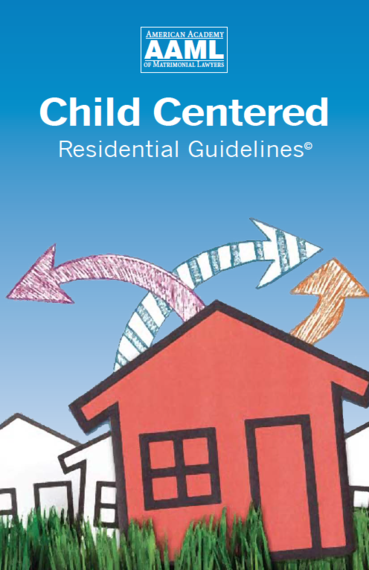Placing children first should be the primary goal of every divorce, but sometimes there is a real lack of guidance and knowledge for parents who are trying to navigate this challenging experience and make informed decisions. As a result, the American Academy of Matrimonial Lawyers (AAML) has developed and released a helpful publication - AAML Child Centered Residential Guidelines. The digital edition is currently available as a free PDF download on the AAML website: www.aaml.org/ccrg.
The guidelines address one of the most difficult challenges a parent must face during a divorce -- deciding how to constructively divide access time with their kids. In order to help keep the divorce process as focused on the needs of the children as possible, the guidelines feature crucial advice from experts, recommended time schedules that spouses can adapt, and practical suggestions for arriving at a cooperative plan for the entire family.
As most states provide, "custody" is to be determined upon a "best interests" standard. AAML Past President Alton Abramowitz envisioned providing a national model, consistent with the aspirations of the Academy, to assist parents, judges, lawyers, mediators and parent educators in drafting child-centered residential guidelines, focusing on best interests, and as a result, reducing parental conflict relating to time-sharing of children.
The AAML Child Centered Residential Guidelines publication was then crafted in close consultation with and the editorial assistance of Robin M. Deutsch, PhD, the Director of the Center of Excellence for Children, Families and the Law at the Massachusetts School of Professional Psychology (MSPP), and an Associate Clinical Professor of Psychology at Harvard Medical School.
One of the main goals of the publication is to address many of the questions that divorcing parents have about how to ensure the needs of their children are placed first, while providing key pieces of advice on some issues that they might not have anticipated. It also offers an essential model that ultimately stands apart from the generally accepted traditional alternating weekend visitation pattern followed by many courts throughout the country.
The parenting time options contained in the guidelines allow each family to choose the appropriate plan after considering the unique circumstances of the family and the characteristics of each of the children. Research does not support any particular parenting plan. Each family needs to consider the age, temperament and special needs of their child, previous caretaking arrangements, and the child's individual relationship with each parent. Most important is that parents are able to communicate about their child on a regular basis. Parents must share information and effectively cooperate so that a child's experience, as he or she transitions between parents, is as seamless as possible. A child should not be drawn into his or her parents' dispute by being exposed to the conflict or acting as a messenger. A child who knows that he or she is more important than the conflict between his or her parents will be better adjusted than the child who becomes subjected to the chronic disputes and tension between his or her parents.
Parents, in addition to attorneys and judges as well as mental health providers, mediators and therapists may find these guidelines useful in resolving parenting time disputes and avoiding disagreements about how much time the child should spend with each parent. At the same time, these guidelines do not prohibit parents, lawyers, mediators and judges from creating parenting time plans that differ from the sample plans contained within the publication. Of course, the residential provisions for kids are only one of the many aspects in a child centered parenting plan.
In addition, the parenting visitation and access schedules presented allow families to choose the most appropriate framework for their children after carefully considering the maturity, circumstances and unique characteristics of each child. The overall goal of the guidelines are to make every minute that a child spends with each parent to be as meaningful as possible, while decreasing the stress and pressures of the custody process and transitions between households.
